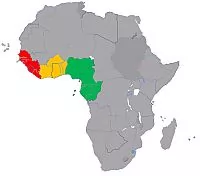South Africa is developing a roadmap to keep its auto industry competitive as principal export markets increasingly adopt new energy technology. The government published an investment plan1 in November while watching regulatory changes in the UK and EU. A month earlier, the European Parliament and Council had reached a deal requiring all new cars in Europe to be zero-emission by 20352 and the UK has since announced plans to ban the sale of petrol and diesel cars by 20303. Now, South Africa intends to prepare its own industry for this transition in three phases.
GETTING TO GREEN
- Phase 1 – Assemble for exports
The government wants to ignite a technological transition by first incentivising carmakers to assemble more electric vehicles, mainly for export. This approach is consistent with the current structure of South Africa's auto industry wherein the sector exports about two-thirds of its output and contributes around 15% of the country's total export revenue. Trade and Industries Minister Ebrahim Patel said policies will initially be geared to increasing exports to 'those markets where there is both the spending power and the regulatory incentives to encourage consumption'.
- Phases 2 and 3 – Make for South Africa
The priority in the latter stages will be to support the industry to fully manufacture new energy vehicles (NEV) and increase its sales in the domestic market. Only about 1000 electric cars and buses were sold last year. Now, policymakers are considering subsidies as part of a new fiscal regime to achieve price parity for internal combustion engine (ICE) vehicles and NEVs by 2027. The long-term ambition is to have one million NEVs on South Africa's roads and have NEVs make up two-thirds of local vehicle sales by 2030. This ambition will be supported by public procurement schemes, which provincial authorities are already piloting. Last year for example, Western Cape province began testing electric buses for rapid transit in Cape Town city.
POLITICAL ROADBLOCKS
Carmakers have been waiting on the government to produce a clear legislative plan since a green paper was published by the Department of Trade and Industries in May 2021. However, planning has been punctured by political risk events that have thinned the government's bandwidth.
First, stability was threatened when the arrest of ex-president Jacob Zuma triggered riots in July that year. President Cyril Ramaphosa declared the unrest an insurrection and tried to reorient his cabinet as factions put the ruling African National Congress (ANC) in disarray. Then in June this year, the president was caught in the Phala Phala scandal involving cash stolen from his farm. An impeachment process followed and the president nearly resigned this month after the investigating panel found that he likely broke the law.
Now, Ramaphosa has resolved to forge ahead by seeking re-election as president of the ANC this month and leading the party into general elections in 2024. In this campaign season, the merits of a stimulus package for the auto industry will be considered in terms of its electoral value.
It is significant here that the vehicle factories employ nearly one million people and are the largest contributors to manufacturing GDP in South Africa. But the electoral value of proposed fiscal incentives is still low in terms of the direct benefits to voting constituents. This is because the seven main carmakers are subsidiaries of foreign companies such as Volkswagen and Toyota, and only about one-third of their output is sold in the domestic market. The main labour union in the sector, the National Union of Metalworkers of South Africa, is also not actively campaigning for a transition to new energy technology.
OUTLOOK
Rationale and impetus for policy supporting technological transition in the South African auto industry are deeply rooted. Even so, core aspects of the government agenda have been made vulnerable by the impeachment process against Ramaphosa and its ongoing fallout. See: Phala Phala and outlook for stability. Timelines for the legislation and execution of a proposed roadmap for the auto sector are increasingly uncertain. Further, the energy policy priority in the medium term will chiefly be to reform the state utility Eskom and resolve the power outages that worsened this year. The auto policy outlook depends on the limited political stock available to Ramaphosa (or a successor) and the pace of energy sector reforms before 2024 elections.
Footnotes
1. South Africa's Just Energy Transition Investment Plan (JET IP) 2023-2027 | The Presidency.
3. Department for Transport. (2020, November 18). Government takes historic step towards net-zero with end of sale of new petrol and diesel cars by 2030. GOV.UK
The content of this article is intended to provide a general guide to the subject matter. Specialist advice should be sought about your specific circumstances.

